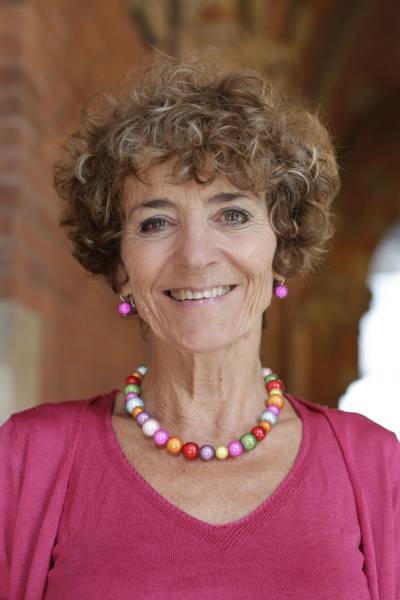Celia Hoyles is a Professor of Mathematics Education at IOE.
What is your role and what does it involve?
I am Professor of Mathematics Education. My role has varied hugely over the years but mainly concerns instigating, leading and fostering research and development in mathematics education. One enduring research interest has been the design of computer environments to engage students in learning mathematics.
How long have you been at UCL and what was your previous role?
I was appointed to IOE, UCL's Faculty of Education and Society in 1984 to a newly established chair. I was the youngest professor then.
What's the most important thing you've learned from your students about the subject you teach?
I have learned that there are so many different, but correct ways of thinking about mathematics and 'doing maths'. We need to listen to our students to understand their unique perspectives, not disregard them. This is good teaching, and, crucially it retains the integrity of the subject alongside respecting learners. If we are to engage more students in mathematics, we need to exploit these different routes to tease out the one that 'resonates', that 'grabs a student's interest'. It is from this basis we can teach mathematics effectively.
“So maths is not a ritual of symbol manipulation but meaningful as a growing discipline.
Computer technology is a powerful way to achieve all these goals, it is dynamic, visual, interactive and shareable and even adaptable. But only when guided by 'good' teachers can this potential be fulfilled.
What working achievement or initiative are you most proud of?
This is very hard: I always love and am proud of the ongoing project that I am involved with at the time. From the case studies of my first project on Logo and maths to the large scale quantitative studies using multilevel modeling of students' conceptions of proof and proving. What I am most proud of are the times when the team has designed some intervention and you can see it really working. Teachers and students really get inspired. This is the outcome of much collaborative labour: with schools and teachers, and with research colleagues and students. I am really proud of all their achievements; many are leading mathematics education all over the world. I am particularly fortunate to have worked for so many years with Professor Richard Noss, founding Director of the UCL Knowledge Lab.
I must admit to being proud of the honours I am lucky enough to have been awarded as recognition of achievements gained while working at IOE – a tribute to the stimulating and collegial atmosphere I have enjoyed here over the years. For example, I was the first recipient in 2004 of the International Commission of Mathematics Instruction (ICMI) Hans Freudenthal medal, and later the first recipient of the Royal Society Kavli Education Medal, both in recognition of a distinguished contribution to mathematics education, I was so proud for my community as well when made an OBE in 2004 and even more so became a Dame Commander of the British Empire 10 years later in 2014. The same year I was elected as President of the Institute of Mathematics and its Applications, the first president from education in a mathematics learned society. I enjoyed the term enormously and learned so much about the mathematics community.
Tell us about a project you are working on now which is top of your to-do list.
I am working on two research projects at the moment: the ScratchMaths: supporting computational and mathematical thinking through programming, funded by the Education Endowment Fund and co-led with Professor Richard Noss, and Developing teachers' mathematical knowledge for teaching through computer-embedded activities with Dr Alison Clarke-Wilson funded by the Nuffield Foundation.
“So, both in primary and secondary schools I still strive for more engagement with mathematics through digital technology.
What would it surprise people to know about you?
I co-presented on a popular TV series of programmes (1987-90) Fun and Games, 6/7 programmes per year with sometimes over 10 million viewers.
I was even offered a business class upgrade when waiting for a flight to the USA if I could answer a puzzle correctly. The outcome is interesting …
What other piece of research outside of your own subject area interests you?
Mathematics is always high on the political agenda. Since I was Chief Adviser for Mathematics to the UK Government and advised the Secretary of State for Education (2004-2007), I remain interested in policy issues in my subject but beyond it: for example trying to explain the 'London effect' and tackling the issue of gender participation. I am a keen tennis player: so I am really interested in how the 'tools of the trade' have changed over the years and how it has shaped the game. So about tennis but also relates back to mathematics as most things do really.
Last updated 27 July 2023.
 Close
Close


